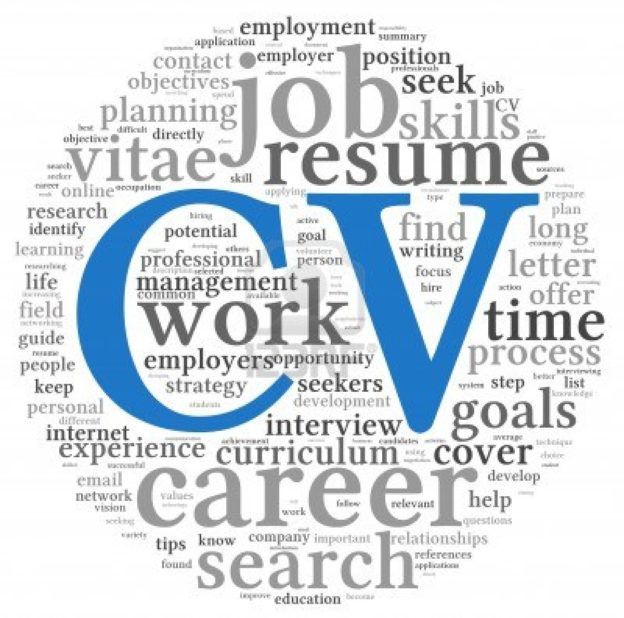Reviewing resume advice is a challenge
Did you know that if you Google the phrase “CV or Resume advice” almost 57 MILLION results are produced? Key in the words separately and you get almost 70 MILLION possibilities. It seems for every job seeker and CV writer, there is someone happy to dish out advice. This is confusing to say the least, because although some advisors are qualified, experienced and up to date, others truthfully, are complete charlatans. A percentage of all this advice can be good. Some is quite contentious, which is wonderful, debate is stimulating. Some can quite often be regionally specific (generally the US, but that’s OK … there are a lot of you). There are also some pieces which are simply misleading.
And then finally, there is a small percentage of resume advice which is actually total nonsense. This last category I’m not even going to mention, most of it is so ridiculous.
How do normal people sort out all the advice?
Unlike many career transition coaches I am still an active in the area of executive research and search. I review hundreds of CVs and profiles a week with a specific end in mind: to find the best candidates globally to meet my client’s needs, so I am often asked to assess CVs or even review articles .
Question? How does the average job seeker sift through the morass of information when preparing their CV and what resume advice do they ditch?
Answer: with difficulty
Here is a small sample of the few things I’ve chosen to react to this year.
It’s the top of the first page that counts
Good : recruiters will generally be looking at your CV because it’s been generated by a key word activated Applicant Tracking System ( ATS) or HRIS (Human Resource Information System) data base search. They will skim through your professional summary/mission statement which needs to be strong to avoid the reject pile. Make sure all contact information is clear and in the top lines. We don’t have time to search. I actually get CVs with no phone numbers. Why make our lives difficult? It doesn’t help you. You have between 15-20 seconds to get a reader’s attention. Use it and your limited amount of white space wisely.
Any one who suggests that CVs of more than 2 pages in length are acceptable, are not active recruiters.
The only time a longer CV could be acceptable is for a senior scientific post where references to academic papers add value.
Chronological / functional CVs are outdated
Contentious : Personally I like to know where a person has worked, for how long, what they did, as well as the major USPs in a tightly worded mission statement. So I prefer to see a mix of functional and chronological information. I don’t want to have to figure anything out. Most of the CVs I see in an extended functional format tend to be from our US cousins – so a cultural difference perhaps. They are more likely to advocate hiding your age – but most recruiters will ask for the year you graduated. It’s always best to own your experience. CVs that are not concise, precise and relevant risk being most in the recruitment black hole.
A professionally written CV is always best
Simply Misleading: A strong, professional CV is vital, but there are some caveats associated with having one that is professionally written by a third party. As a coach I believe a CV should be written by the candidate themselves, with qualified, professional coaching support as required. This gives complete ownership of the process to the individual. As a recruiter, I have seen too many candidates with strong professionally written CVs fall at the first hurdle of a telephone screening, literally because they are a shadow of their own resumes. This strengthens my belief that you need to own your own message to guarantee success.
Personal objectives are out
Good: we actually don’t care what you want! All we want to know is what have you done and can you do it for our client? If the client is interested in you, a good recruiter or search consultant will try to persuade you to do something different anyway. Rigid objectives limit creative thinking. Use numbers and strong language to illustrate your success stories succinctly. Or as Jim Rohn said
“Don’t bring your need to the marketplace, bring your skill.”
Cover letters are obsolete
Contentious: This is a view propounded by many. Phil Rosenberg President at re-Careered makes a compelling case in his post on the subject. To some extent I generally go along with the hypothesis. In large, international companies with automated processes this is definitely true.
However, there are still some instances when a cover letter does help: in a small company, with a personal connection or if the cover letter is in a different language to your CV. The latter happens frequently in Europe where the corporate lingua franca is English, but the readers themselves are not Anglophones. It’s all about targeting each application specifically, whether via customizing a resume or making a decision to use a cover letter, which I know is hard work. So no, I don’t think cover letters are obsolete – there is just a new need to use them judiciously. Many career advisors are American and may not need to understand the systems of other geographies.
Coloured fonts, charts and tables are great
Simply Misleading: Some ATS systems will not recognise sophisticated layouts, including all of those points. So unless applying for a creative or design job, when uploading a CV especially via a web site, there is no substitute for a straightforward Word Document with clear headings, bullet points, white space, plus a decent size font, 10-12 points. An ATS will usually indicate if a pdf format will work.
Most CVs are read initially on a computer screen and increasingly a mobile device. Resume design should take that into account. Complex layout turns a CV almost into a personal presentation and perhaps best taken as a hard copy to an interview or even included on your LinkedIn profile using the Slide Share Application or Features section.
Include your professional network url LinkedIn or other
Good : I always check a CV against an on-line profile or a professional network if there is one. These profiles quite often contain quick links to company information which is very helpful. However, as I work globally, I obviously have to take into account that candidates can come from cultures and countries where social media and even broadband penetration is lower.
Traditional resumes are dead
Contentious : There is no doubt that on-line presence is becoming a major factor in the early stages of identifying candidates. But to date I have never been involved in any search where the candidate has not eventually been asked to produce a CV somewhere in the process. Ever.
This would be in addition to a professional internet profile which savvy recruiters have already viewed. So I think they will be around for quite a while longer, but perhaps used more frequently in conjunction with other recruiting techniques. Frequently I print off a LinkedIn profile as a pdf for a client if there is a time constraint.
Personal information is irrelevant
Simply Misleading: Some personal information can be judiciously included in a CV and can say a lot about a candidate. I always scan it. Do include non professional achievements, publications, keynote speaking, awards and activities – within reason. Your U14 MVP mention is clearly of no interest. I would definitely not give a home address – simply indicate location for security reasons. You are no longer required to indicate nationality, date of birth, the year of graduation or marital status.
Good recruiters will always figure out age anyway – but as ATS are frequently programmed with date parameters it can be a good omission. Although not always as ATS maybe set up to exclude resumes with no dates.
I have seen some articles advocating hiding age – but if anyone does that, for me it sends a message that they are in an older demographic and uncomfortable with it. Don’t forget that we all leave our trail in cyber space and recruiters do access Facebook , LinkedIn , Twitter and Google to run checks! Some get to learn more about us than we want them too, or even realise!
Hopefully as we move towards more bias managed processes some of these factors will be handled neutrally.
That’s about it – until the next batch of advice comes out!
If you need help with your career transition – get in touch now!







Dorothy,
What a well-thought-out, thorough and on-target message regarding resumes!
I agree that the top of the first page counts, and for the reasons you describe. Your assertion that summary/mission (profile) needs to be strong to avoid the reject pile is spot on.
I also strongly agree that a mix of chronological and functional resume information is effective.
Moreover, regarding personal information, I concur! As an example, a utilities executive I recently wrote for indicated that his personal community affiliations were vital to be included on his resume, and were expected information at his level and in his industry.
The only comment you made that I would suggest be ‘enhanced’ is in regard to a professionally written resume ‘not’ increasing the candidate’s chances. From my perspective as a professional resume writer who has helped lift candidates’ messages to the top of the interview ‘review’ pile, I’d encourage another viewpoint. If the professional resume process is highly collaborative, quite in-depth (i.e., the candidate does heavy and intellectually rigorous lifting during the processes), he will then own the message and be able to confidently present himself during the interview, mirroring the resume (vs. being a shadow of the resume).
Though I realize not all resume writing processes involve such depth of collaboration and candidate ownership of the processes; in the instances where this is happening, I believe the professional version is high-performing and maps to the candidate’s perceived value of himself.
Again, I really enjoyed your thorough overview of the resume review process in this pithy blog post article, which I am bookmarking!
Enjoy reading you on Twitter-sphere as well.
Sincerely,
Jacqui (@ValueIntoWords: Twitter)
Jacqui – thanks for your comments. I totally agree that professional coaching in writing a resume is invaluabe, where the candidate has to dig deep into themselves to identify and articulate their message and is simply being supported in this process. I’m sorry if this wasn’t clear enough.
But I distinguish this process from CVs that have been written on the candidates behalf by a third party. I’ve seen CVs written by ad agency copywriters for example , journalists , editors, or other “writing ” professionals or sometimes not even – anyone with a Mac and a spellchecker! The syntax, vocabulary and layout might all be great on the surface, but during the screening process the candidate becomes undone where he /she is less zappy than their resume.
My point is that it is misleading to suggest that a CV written by a professional will increase a candidates chances. It may not! They need to own the message contained in it.
Thanks for your reply!
I think we’re on the same page:) Bottom line: it’s about the candidate ‘owning the message.’
Thanks Dorothy!
Jacqui